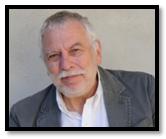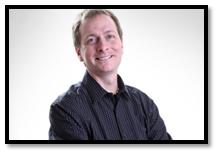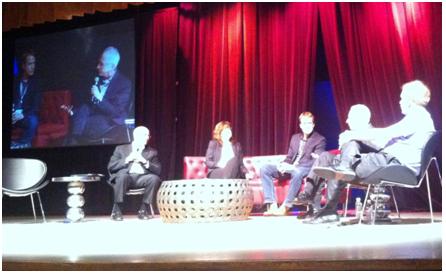I’ve been to a number of these Convergence conferences put together by Eric Rhoads and the Radio Ink team. From Deborah Parenti to Ed Ryan to Lois Chooljian, these events are always on-point, fresh, and seamless.
This year was no different, and while I was only able to attend the first day, I kept wishing that everyone in radio could have done more than read a bunch of tweets flying from the Santa Clara Convention Center.
The panels were timely and on-point, and I was fortunate to be a part of the “Digital Dashboard,” moderated deftly by Greater Media’s Buzz Knight (pictured above), along with Toyota’s John Bucci, GM’s Frankie James, and Harman’s Robert Acker. It was a lively discussion that gave attendees a look at where the automotive in-dash world is moving, and why it so matters to radio.
Two of the highlights for me were keynoters Nolan Bushnell and Rob Curley.
 Bushnell (pictured) – among other things – founded Atari and Chuck E. Cheese. He’s the guy who invented the all-time great time waster Pong. And in his rambling and self-effacing comments, he told Convergence attendees that consumers want novelty, but they also want predictability – a fine line for brands to walk. (Don’t we know this since the origins of PPM?)
Bushnell (pictured) – among other things – founded Atari and Chuck E. Cheese. He’s the guy who invented the all-time great time waster Pong. And in his rambling and self-effacing comments, he told Convergence attendees that consumers want novelty, but they also want predictability – a fine line for brands to walk. (Don’t we know this since the origins of PPM?)
Bushnell also dropped the following thoughts on an eager audience:
- Drink from a fire hose whenever you can.
- Radio’s future will be dependent on the vision of its CEOs.
- You have to have an app to participate in the mobile space.
- It’s not about your pipe – it’s about your ad network.
- Innovation has no constituency because it’s now.
- To prepare for the future, read as much science fiction as you can.
- Share of mind is what radio has right now. Tell your customers that there are new ways of doing radio that are cooler and in the process, transform your brand.
Bushnell also talked about the auto autos – driverless cars that are a Google initiative he firmly believes will take hold over the next few years. Of course, this has implications for radio: shorter commute times and the ability for “drivers” to consume video and the Internet as they go from Point A to Point B.
 Just a couple hours later, it was Rob Curley (pictured) who has done some amazing things to transform the Las Vegas Sun. Rob gave us a grim view of the newspaper industry, but then walked us through the process of transitioning his paper. Taking a “Moneyball” tactic – turning the numbers on their side to tell us new truths – Rob discussed the Five Ps that describe success in the digital/web world in which we now live:
Just a couple hours later, it was Rob Curley (pictured) who has done some amazing things to transform the Las Vegas Sun. Rob gave us a grim view of the newspaper industry, but then walked us through the process of transitioning his paper. Taking a “Moneyball” tactic – turning the numbers on their side to tell us new truths – Rob discussed the Five Ps that describe success in the digital/web world in which we now live:
- Passion
- Practical
- Playful
- Personal communication
- Porn
Those are the elements that he and his team started to bake into the culture and the content of the Sun, and they very much describe the challenges that radio broadcasters face in this space. (As for the porn part, when you’re in Las Vegas, you have a “sexual” part of a web effort, just like many radio stations manage to weave it into their digital products.)
Part of the challenge is that traditional media people often don’t understand the new ecosystems they’re using. Taking our on-air content and just slapping it into apps, websites, and Facebook pages requires a strong sense about how consumers use each of these media – something that many radio people struggle with.
Curley showed us a great example of Las Vegas Weekly Sarah Feldberg doing a walk-through of their iPhone app – a display of her knowledge and understanding of how consumers use and benefit from smartphones and apps.
>EMAIL RECIPIENTS: CLICK HERE TO WATCH LAS VEGAS WEEKLY‘S iPHONE APP VIDEO<
We have talked about similar concepts on this blog – using the power of personalities to demonstrate all the different ways and channels in which to enjoy, access, and provide feedback. Too often, we assume that listeners will figure it out on their own.
Convergence was a reminder that radio continues to struggle with fundamental questions – local or not, what’s the role of mobile, what do we do with HD radio, how do we market and monetize our digital assets, how can we compete in the new media world with diminishing budgets, and how do we design strategies to transition our brands and our industry.
I’m not going to tell you that if you attended Convergence you’d have figured it out on the airplane ride back to Orlando, Los Angeles, Philadelphia, or wherever you live.
But you’d be a lot further along in understanding the complexity of the challenges, and the excitement that radio can still inject into its efforts to remain relevant and successful in the coming years.
Converge away.
- A 2020 Lesson?It Could All Be Gone In A Flash - April 24, 2025
- How AI Can Give Radio Personalities More…PERSONALITY - April 23, 2025
- Can Radio Afford To Miss The Short Videos Boat? - April 22, 2025





Leave a Reply